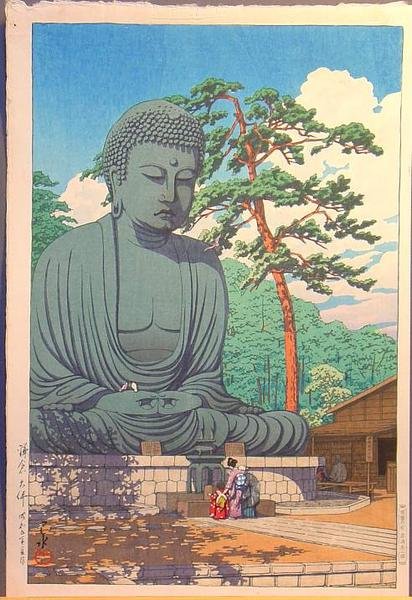Winter Meetings ~ Haiku of Japan
You meet the Buddha in the strangest places in Japan.
fuyu warabi juka no ishibotoke ware to au
under the trees I meet
the stone buddha
—Mori Sumio


If you every make it to Japan and start exploring, one thing you will immediately notice is that there are stone statues of various Buddhist deities everywhere. Often the statues are Jizo-sama, but others as well. Kannon-sama and Fudo-sama are also fairly common. Along busy (or not-so-busy) roads, next to buildings, next to or within small areas of green in the city. But meeting these buddhas isn't so strange. What does feel strange is when you meet them in the middle of nowhere; you might find yourself hiking in the forest in the middle of nowhere and come across a well worn Buddhist statue, often with fresh offering of sake. It is strange at first, but also somewhat pleasant to come across. You meet Buddha in the oddest places in Japan!
The season word (kigo) here is winter bracken, or fuyu warabi. My saijiki (season word encyclopedia) tells me that the plant grows quite high in winter and looks like a flower. It is usually found in the mountains, so that gives you an idea of the setting for the stone buddha the poet came across. It is a season word for all of winter.
❦


 |
David LaSpina is an American photographer and translator lost in Japan, trying to capture the beauty of this country one photo at a time and searching for the perfect haiku. |
If this blog post has entertained or helped you, please follow/upvote/reblog. If you want to further support my writing, donations are welcome.
That is, me! If you like this translation, feel free to use it. Just credit me. Also link here if you can. ↩
Great Buddha poem! It makes me think that I have to insert some spirituality in my poems because I feel it defines me and didn't approach it.
Glad you liked it!
I don't think the mention of the Buddha is necessarily a spiritual element in this poem, merely an object that the poet came across that he is using to evoke an image of a remove yet well tended area.
That said, if you feel the desire to put some spirituality into one of your poems, I don't think you should shy away from it.
!PIZZA
as per usual, thank you for not just the poem, but the explanation which helps us understand it.
You're welcome. Glad you enjoyed it!
!PIZZA
I gifted $PIZZA slices here:
@dbooster(2/15) tipped @stuartcturnbull (x1)
dbooster tipped maylenasland (x1)
Please vote for pizza.witness!